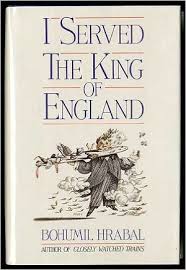I Served the King of England, by Bohomil Hrabal (1971)

While I was careful to preface Ethiopia through writers’ eyes with the following caveat:
“Like all those possessing a library, Aurelian was aware that he was guilty of not knowing his in its entirety.”
The Theologians, Jorge Luis Borges
It rests that as soon as a book is launched into the world, be it from the flat topped amba of Mount Abora, a multitude of overlooked works immediately begin to form a perilously high tower of their own.
Here then, after the ‘Canon’ of Ethiopia through writers’ eyes, the Apocrypha:
I served the king of England (Bohomil Hrabal,1971)

“Then Haile Selassie himself arrived, accompanied by the Prime Minister, all our generals, and all the potentates of the Ethiopian army, every one of them covered with medals. The Emperor won us all over. He was dressed almost casually, in a kind of white uniform with no medals, while the members of his government or the atamans of his tribes wore colorful robes and some of them carried big swords, but as they took their places it was obvious that they were well behaved and natural. Tables for three hundred guests were set in the dining rooms of the Hotel Paris, and at each place was a set of sparkling gold forks and knives and spoons. Haile Selassie was given a warm welcome by the Prime Minister, and he responded in a barking voice, saying through his interpreter that he had the pleasure of welcoming his guests to an Ethiopian meal.”
Bohomil Hrabal (1914-1997) is considered by many to be the greatest twentieth century Czech writer. He is certainly the funniest. Hrabal’s I served the king of England cannot in any fashion be said to be about Ethiopia per se – and nor is it about England either.
Rather, the story relates the life of Ditie, a Bohemian lad who works his way to the top of the Bohemian catering industry, from waiter to hotel magnate, in a series of Mittel Europa locations on the eve of World War Two. Ditie’s burning desire is to own a hotel patronised by foreign celebrities. A dream fulfilled when the exiled King of Ethiopia (we are in 1936) is invited to a state banquet. The ‘Ethiopian’ meal in question (no injera! a bull enfolding a sheep stuffed with a peacock filled with a… but you get the idea) is a farce of epic proportions.
